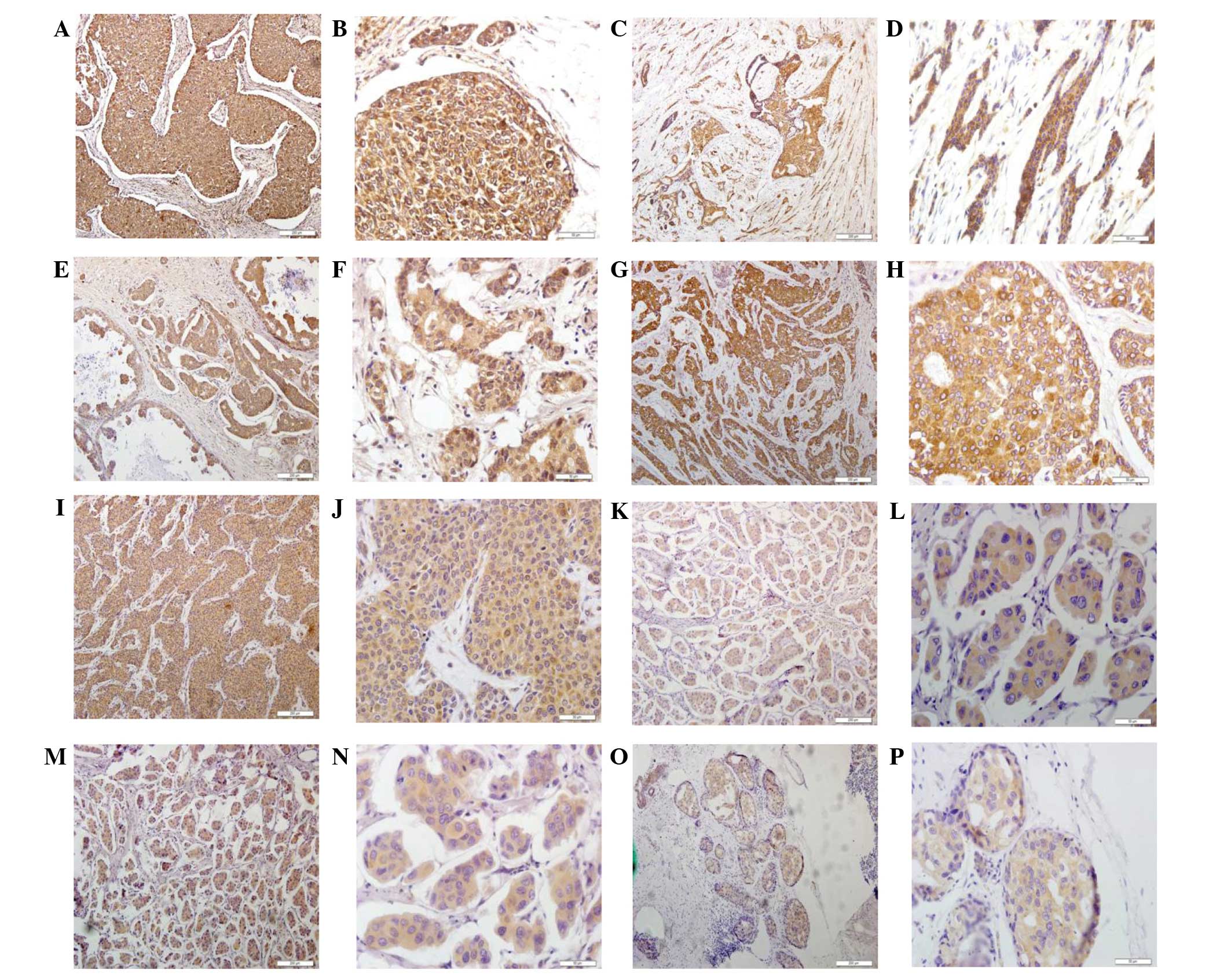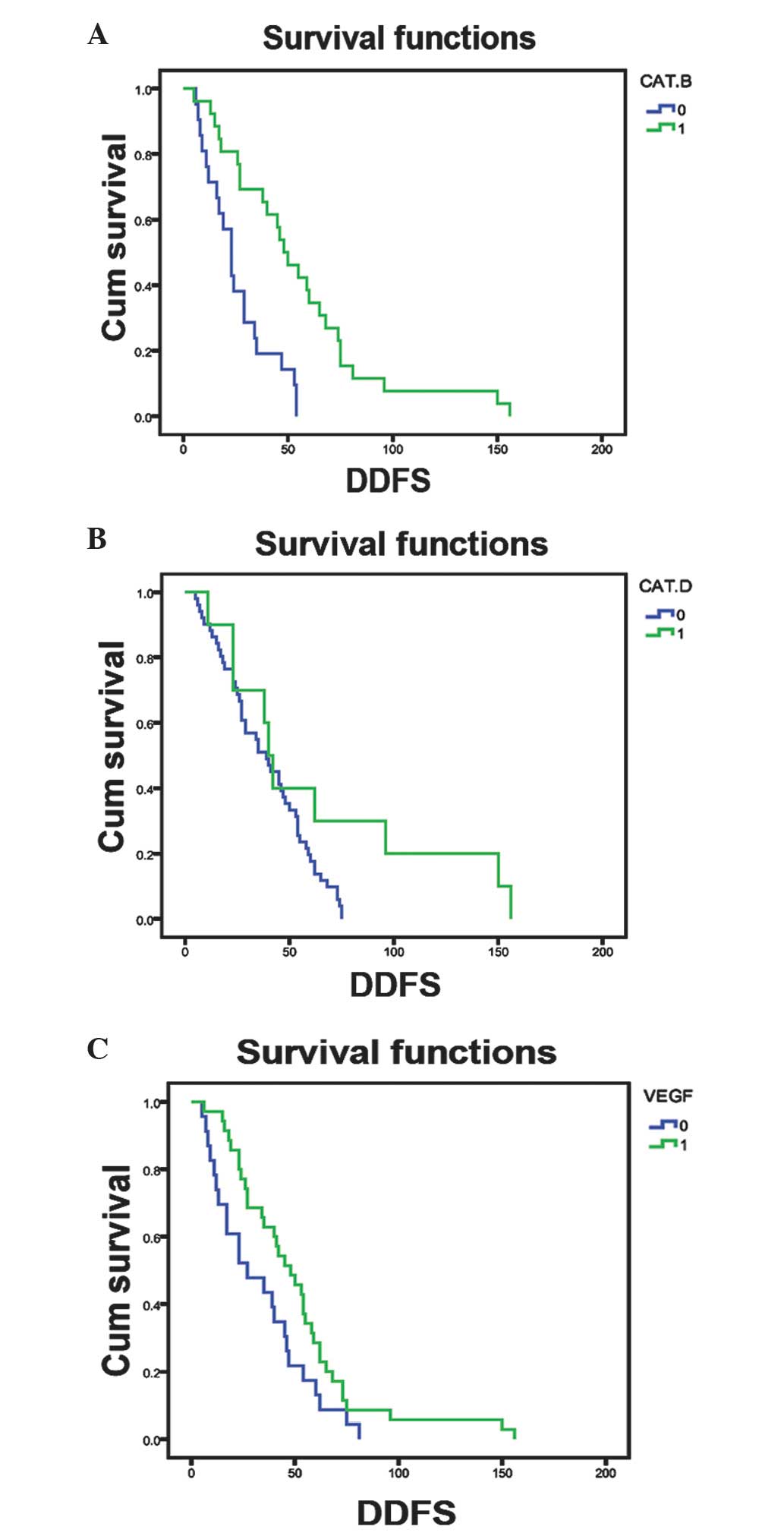|
1
|
Figueroa-Magalhaes MC, Jelovac D, Connolly
RM and Wolff AC: Treatment of HER2-positive breast cancer. Breast.
23:128–136. 2014. View Article : Google Scholar : PubMed/NCBI
|
|
2
|
Herold CI and Anders CK: New targets for
triple-negative breast cancer. Oncology (Williston Park).
27:846–854. 2013.PubMed/NCBI
|
|
3
|
DeSantis C, Ma J, Bryan L and Jemal A:
Breast cancer statistics, 2013. CA Cancer J Clin. 64:52–62. 2014.
View Article : Google Scholar : PubMed/NCBI
|
|
4
|
Turk B, Turk D and Turk V: Lysosomal
cysteine proteases: More than scavengers. Biochim Biophys Acta.
1477:98–111. 2000. View Article : Google Scholar : PubMed/NCBI
|
|
5
|
López-Otín C and Overall CM: Protease
degradomics: A new challenge for proteomics. Nat Rev Mol Cell Biol.
3:509–519. 2002. View
Article : Google Scholar : PubMed/NCBI
|
|
6
|
Gocheva V and Joyce JA: Cysteine
cathepsins and the cutting edge of cancer invasion. Cell Cycle.
6:60–64. 2007. View Article : Google Scholar : PubMed/NCBI
|
|
7
|
Chen JM, Dando PM, Rawlings ND, et al:
Cloning, isolation, and characterization of mammalian legumain, an
asparaginyl endopeptidase. J Biol Chem. 272:8090–8098. 1997.
View Article : Google Scholar : PubMed/NCBI
|
|
8
|
Chen JM, Rawlings ND, Stevens RA and
Barrett AJ: Identification of the active site of legumain links it
to caspases, clostripain and gingipains in a new clan of cysteine
endopeptidases. FEBS Lett. 441:361–365. 1998. View Article : Google Scholar : PubMed/NCBI
|
|
9
|
Im E and Kazlauskas A: The role of
cathepsins in ocular physiology and pathology. Exp Eye Res.
84:383–388. 2007. View Article : Google Scholar : PubMed/NCBI
|
|
10
|
Tan GJ, Peng ZK, Lu JP and Tang FQ:
Cathepsins mediate tumor metastasis. World J Biol Chem. 4:91–101.
2013.PubMed/NCBI
|
|
11
|
Mohamed MM and Sloane BF: Cysteine
cathepsins: Multifunctional enzymes in cancer. Nat Rev Cancer.
6:764–775. 2006. View
Article : Google Scholar : PubMed/NCBI
|
|
12
|
Jedeszko C and Sloane BF: Cysteine
cathepsins in human cancer. Biol Chem. 385:1017–1027. 2004.
View Article : Google Scholar : PubMed/NCBI
|
|
13
|
Krepela E: Cysteine proteinases in tumor
cell growth and apoptosis. Neoplasma. 48:332–349. 2001.PubMed/NCBI
|
|
14
|
Joyce JA and Hanahan D: Multiple roles for
cysteine cathepsins in cancer. Cell Cycle. 3:1516–1619. 2004.
View Article : Google Scholar : PubMed/NCBI
|
|
15
|
Gondi CS and Rao JS: Cathepsin B as a
cancer target. Expert Opin Ther Targets. 17:281–291. 2013.
View Article : Google Scholar : PubMed/NCBI
|
|
16
|
Frlan R and Gobec S: Inhibitors of
cathepsin B. Curr Med Chem. 13:2309–2327. 2006. View Article : Google Scholar : PubMed/NCBI
|
|
17
|
Masson O, Bach AS, Derocq D, et al:
Pathophysiological functions of cathepsin D: Targeting its
catalytic activity versus its protein binding activity? Biochimie.
92:1635–1643. 2010. View Article : Google Scholar : PubMed/NCBI
|
|
18
|
Benes P, Vetvicka V and Fusek M: Cathepsin
D-many functions of one aspartic protease. Crit Rev Oncol Hematol.
68:12–28. 2008. View Article : Google Scholar : PubMed/NCBI
|
|
19
|
Clezardin P: Therapeutic targets for bone
metastases in breast cancer. Breast Cancer Res. 13:2072011.
View Article : Google Scholar : PubMed/NCBI
|
|
20
|
Huang L, Liu Z, Chen S, Liu Y and Shao Z:
A prognostic model for triple-negative breast cancer patients based
on node status, cathepsin-D and Ki-67 index. PLoS One.
8:e830812013. View Article : Google Scholar : PubMed/NCBI
|
|
21
|
Dian D, Heublein S, Wiest I, et al:
Significance of the tumor protease cathepsin D for the biology of
breast cancer. Histol Histopathol. 29:433–438. 2014.PubMed/NCBI
|
|
22
|
Kawakubo T, Yasukochi A, Toyama T, et al:
Repression of cathepsin E expression increases the risk of mammary
carcinogenesis and links to poor prognosis in breast cancer.
Carcinogenesis. 35:714–726. 2014. View Article : Google Scholar : PubMed/NCBI
|
|
23
|
Bengsch F, Buck A, Günther SC, et al: Cell
type-dependent pathogenic functions of overexpressed human
cathepsin B in murine breast cancer progression. Oncogene.
33:4474–4484. 2014. View Article : Google Scholar : PubMed/NCBI
|
|
24
|
Esteva FJ and Hortobagyi GN: Prognostic
molecular markers in early breast cancer. Breast Cancer Res.
6:109–118. 2004. View
Article : Google Scholar : PubMed/NCBI
|
|
25
|
Rochefort H, Garcia M, Glondu M, et al:
Cathepsin D in breast cancer: Mechanisms and clinical applications,
a 1999 overview. Clin Chim Acta. 291:157–170. 2000. View Article : Google Scholar : PubMed/NCBI
|
|
26
|
Tomoo K: Development of cathepsin
inhibitors and structure-based design of cathepsin B-specific
inhibitor. Curr Top Med Chem. 10:696–707. 2010. View Article : Google Scholar : PubMed/NCBI
|
|
27
|
Turk V, Stoka V, Vasiljeva O, Renko M, Sun
T, Turk B and Turk D: Cysteine cathepsins: From structure, function
and regulation to new frontiers. Biochim Biophys Acta. 1824:68–88.
2012. View Article : Google Scholar : PubMed/NCBI
|
|
28
|
Hashida S, Kominami E and Katunuma N:
Inhibitions of cathepsin B and cathepsin L by E-64 in vivo. II.
Incorporation of [3H] E-64 into rat liver lysosomes in vivo.
J Biochem. 91:1373–1380. 1982.PubMed/NCBI
|
|
29
|
Hara K, Kominami E and Katunuma N: Effect
of proteinase inhibitors on intracellular processing of cathepsin
B, H and L in rat macrophages. FEBS Lett. 231:229–231. 1988.
View Article : Google Scholar : PubMed/NCBI
|
|
30
|
Tsukuba T, Okamoto K, Yasuda Y, et al: New
functional aspects of cathepsin D and cathepsin E. Mol Cells.
10:601–611. 2000. View Article : Google Scholar : PubMed/NCBI
|
|
31
|
Garcia M, Platet N, Liaudet E, et al:
Biological and clinical significance of cathepsin D in breast
cancer metastasis. Stem Cells. 14:642–650. 1996. View Article : Google Scholar : PubMed/NCBI
|
|
32
|
Vetvicka V and Fusek M: Procathepsin D as
a tumor marker, anti-cancer drug or screening agent. Anticancer
Agents Med Chem. 12:172–175. 2012. View Article : Google Scholar : PubMed/NCBI
|
|
33
|
Nicotra G, Castino R, Follo C, Peracchio
C, Valente G and Isidoro C: The dilemma: Does tissue expression of
cathepsin D reflect tumor malignancy? The question: Does the assay
truly mirror cathepsin D mis-function in the tumor? Cancer Biomark.
7:47–64. 2010.
|
|
34
|
Markićević M, Kanjer K, Mandušić V, et al:
Cathepsin D as an indicator of clinical outcome in early breast
carcinoma during the first 3 years of follow-up. Biomark Med.
7:747–758. 2013. View Article : Google Scholar : PubMed/NCBI
|
|
35
|
Zhong YJ, Shao LH and Li Y: Cathepsin
B-cleavable doxorubicin prodrugs for targeted cancer therapy
(Review). Int J Oncol. 42:373–383. 2013.PubMed/NCBI
|
|
36
|
Nouh MA, Mohamed MM, El-Shinawi M, et al:
A potential prognostic marker for inflammatory breast cancer. J
Transl Med. 9:12011. View Article : Google Scholar : PubMed/NCBI
|
|
37
|
Deaton DN and Tavares FX: Design of
cathepsin K inhibitors for osteoporosis. Curr Top Med Chem.
5:1639–1675. 2005. View Article : Google Scholar : PubMed/NCBI
|
|
38
|
Hoegl L, Korting HC and Klebe G:
Inhibitors of aspartic proteases in human diseases: Molecular
modeling comes of age. Pharmazie. 54:319–329. 1999.PubMed/NCBI
|
|
39
|
Withana NP, Blum G, Sameni M, et al:
Cathepsin B inhibition limits bone metastasis in breast cancer.
Cancer Res. 72:1199–1209. 2012. View Article : Google Scholar : PubMed/NCBI
|
|
40
|
Frizler M, Stirnberg M, Sisay MT and
Gutschow M: Development of nitrile-based peptidic inhibitors of
cysteine cathepsins. Curr Top Med Chem. 10:294–322. 2010.
View Article : Google Scholar : PubMed/NCBI
|
















